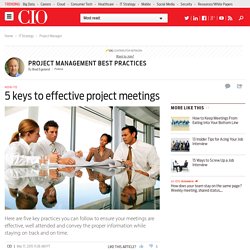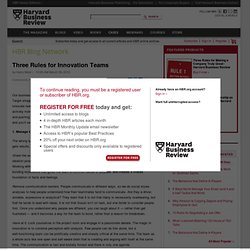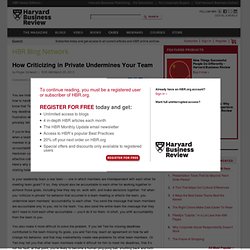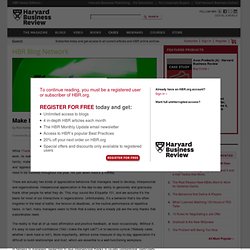

How to Refocus a Meeting After Someone Interrupts. You did everything you were supposed to do: Invited all the right people, sent out an agenda in advance, and got everyone’s agreement on the process.

Despite your diligence, your meeting is being hijacked. How should you handle a persistent interrupter? Will it work to just ignore the person? And how can you get the meeting back on track? What the Experts Say Whether it’s a team member who disagrees with your approach, an employee from another department who brings up irrelevant information, or a colleague who wants to use your meeting as a soapbox for his own personal agenda, dealing with interrupters during a meeting is challenging. 5 Ways To Guarantee Your Event Fails - Eventbrite Blog. Organising an event takes time, money and lots of hard work, so if you don’t achieve the results you hoped for it can be very disappointing.

There are a number of reasons why events don’t quite hit the mark, but we’ve compiled a list of the 5 most common. Make sure none of these apply to your event and you’ll be more likely to meet your objectives and delight your guests. 1. Adopt a one-size-fits-all approach Taking a homogenous approach to event planning is one of the main reasons events fail. Likewise, attendees themselves come in a variety of different shapes and sizes. 5 keys to effective project meetings. Today we will look at five key practices to adhere to in order to make sure you are never that person running an inefficient meeting.

Sticking to these practices will help make sure you have great meetings that are well attended because you have an awesome reputation for conducting only meaningful and well led meetings that people leave feeling smarter than when they went in. Send out an advance agenda. Do yourself and your attendees a huge favor -- send out an agenda in advance. It doesn't have to be fully detailed. It doesn't even have to be the final version. Start promptly. Never cancel. End on time. Stay on topic. 3 Improv Exercises That Can Change the Way Your Team Works. What can leaders learn from improv comedians?

For five decades, The Second City comedy theatre and school of improvisation has been a launch pad for the leading comic performers of our times, from Alan Arkin to John Belushi, Gilda Radner to Tina Fey, and Steve Carell to Stephen Colbert, and many more. In a reference to our talent development prowess, we’ve been called the Harvard of Comedy (which is great, except that we think Harvard is the Second City of higher education). We’ve been quite intentional about creating training curricula to reliably fill our pipeline, and as we’ve honed our methods, we’ve seen that improv principles are highly applicable to the corporate world.
Drawing on lessons we’ve learned, my group, Second City Works, now counsels leaders during 400 engagements a year, about half with Fortune 1000 companies. Of all the lessons we share, these three are perhaps the most important: Embrace the ensemble Take responsible risk. Three Rules for Innovation Teams - Harry West. By Harry West | 10:26 AM March 29, 2012 Our business at Continuum is design and innovation (if you’ve used a Swiffer or pushed a new Target shopping cart, you’ve encountered us), so naturally we are always looking for ways to innovate how we innovate.

Three refinements to our team approach are making a difference: actively managing creative friction; making project rooms the focal point of the work environment; and pushing as much creativity into commercialization as into conceptualization. Follow these rules, and you’ll see a dramatic difference in your own team’s ability to innovate: 1. Manage Creative Friction The wrong type of friction on teams makes people hate each other and hold back, but the right type gets results.
Share the experience. Remove communication barriers. Have at it. 2. The forum for this debate is the project room. But the project room should not isolate the team. And put project rooms at the center of action in the company. How Criticizing in Private Undermines Your Team - Roger Schwarz. By Roger Schwarz | 8:00 AM March 25, 2013 You are holding your weekly team leadership meeting.

Make It a Habit to Give Thanks - Ron Ashkenas. By Ron Ashkenas | 12:00 PM November 20, 2012 While Thanksgiving in the U.S. is celebrated with sports events, family dinners, and time off from work, its real purpose is to reflect on everything that we have to be thankful for — such as health, family, material possessions, and general success.

It’s also a good reminder that “thankfulness” and “appreciation” are important managerial behaviors in effective organizations — behaviors that need to be fostered throughout the year, not just when there’s a holiday. There are actually two kinds of appreciative behaviors that managers need to develop, interpersonal and organizational. Interpersonal appreciation is the day-to-day ability to genuinely and graciously thank other people for what they do. This may sound like Etiquette 101, and we assume it’s the basis for most of our interactions in organizations.
The reality is that all of us need affirmation and positive feedback, at least occasionally.